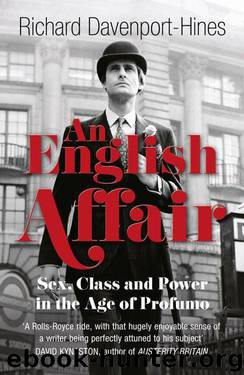An English Affair: Sex, Class and Power in the Age of Profumo by Davenport-Hines Richard

Author:Davenport-Hines, Richard [Davenport-Hines, Richard]
Language: eng
Format: azw3, epub
Publisher: HarperCollins Publishers
Published: 2012-12-16T13:00:00+00:00
EIGHT
Spies
Harold Macmillan seldom lost his temper publicly. He did so, however, at an Oxford dinner of 1981 held in honour of Hugh Trevor-Roper. Sir Michael Howard, one of the official historians of wartime intelligence, had just made a jocular speech referring to the double agent codenamed Garbo. The ex-Prime Minister rose to declare that he had never heard such a shocking speech in his life: national security was no joking matter; indeed, it should seldom be mentioned. This represented the uniform view of intelligence held in Whitehall. ‘In Britain the activities of the intelligence and security services have always been regarded in much the same light as marital sex,’ as Howard explained four years later. ‘Everyone knows that it goes on and is quite content that it should, but to speak, write or ask questions about it is regarded as exceedingly bad form. So far as official government policy is concerned, the British security and intelligence services, MI5 and MI6, do not exist. Intelligence is brought by the storks, and enemy agents are found under gooseberry bushes. Government records bearing on intelligence activities are either industriously “weeded” or kept indefinitely closed. Members of Parliament who ask questions are heard in icy silence and choked off with the most abrupt and inexplicit of replies.’ The history of espionage, Howard lamented, was the preserve of ‘inquisitive journalists, disgruntled professionals and imaginative fiction writers – categories that confusingly overlap’.1
Perhaps it is not surprising that Macmillan’s humour failed him in 1981, for espionage cases repeatedly disrupted his exercise of power. It fell to him as Foreign Secretary in 1955 to give a tricky Commons statement on the defection of the diplomats Guy Burgess and Donald Maclean to Moscow. (He decided against recalling his own discussion thirty years earlier with a senior Foreign Office man about applying for a diplomatic post. ‘You will be asked lots of questions,’ he was told, ‘but there are only two that matter: What is the name of your father; Who is your boot-maker?’) The first great reverse of his premiership was the failure of the Paris summit of 1960, which Khrushchev sabotaged on the pretext of indignation over the American U-2 spy plane. The collapse of confidence in his political prescience was started by the Vassall spy case of 1962, and intensified by the stunts about national security staged by his enemies during the Profumo Affair.2
Sex, class and official secrecy were connected taboos. The uproar after the disappearance of Burgess and Maclean aroused class tensions. They were public school men, Cambridge graduates, alcoholics: Burgess an outright member of the ‘Homintern’, and Maclean bisexual. They had been recruited into government service by social contacts; they had been shielded by friends; and they had proved traitors. Journalists from less privileged backgrounds, who felt socially excluded from the civil service, decried the system that had nurtured both men. Insiders lost their sacrosanct aura; outsiders felt free to express their animosity.
Two cases involving Englishmen who worked in the Moscow embassy and spied for
Download
An English Affair: Sex, Class and Power in the Age of Profumo by Davenport-Hines Richard.epub
This site does not store any files on its server. We only index and link to content provided by other sites. Please contact the content providers to delete copyright contents if any and email us, we'll remove relevant links or contents immediately.
| Belgium | France |
| Germany | Great Britain |
| Greenland | Italy |
| Netherlands | Romania |
| Scandinavia |
Room 212 by Kate Stewart(5105)
The Crown by Robert Lacey(4807)
Endurance: Shackleton's Incredible Voyage by Alfred Lansing(4769)
The Iron Duke by The Iron Duke(4350)
The Rape of Nanking by Iris Chang(4203)
Joan of Arc by Mary Gordon(4103)
Killing England by Bill O'Reilly(3997)
Say Nothing by Patrick Radden Keefe(3975)
I'll Give You the Sun by Jandy Nelson(3429)
Shadow of Night by Deborah Harkness(3361)
Hitler's Monsters by Eric Kurlander(3329)
Mary, Queen of Scots, and the Murder of Lord Darnley by Alison Weir(3208)
Blood and Sand by Alex Von Tunzelmann(3195)
Eleanor & Park by Rainbow Rowell(3153)
Darkest Hour by Anthony McCarten(3119)
Margaret Thatcher: The Autobiography by Thatcher Margaret(3080)
Book of Life by Deborah Harkness(2933)
Red Famine: Stalin's War on Ukraine by Anne Applebaum(2929)
The One Memory of Flora Banks by Emily Barr(2857)
